Post by Rinconrolla on Jun 8, 2010 23:50:59 GMT -5
The making of a Radiator Cooling Shield .
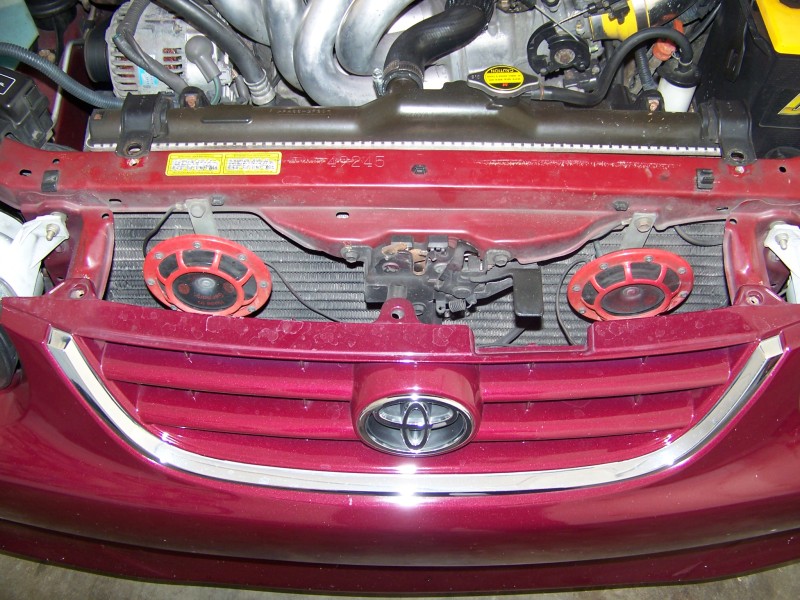
First I measured . Then I went to my local Home Depot and purchased a pre-cut piece of aluminum sheet metal . This sheet was 27 x 12 .
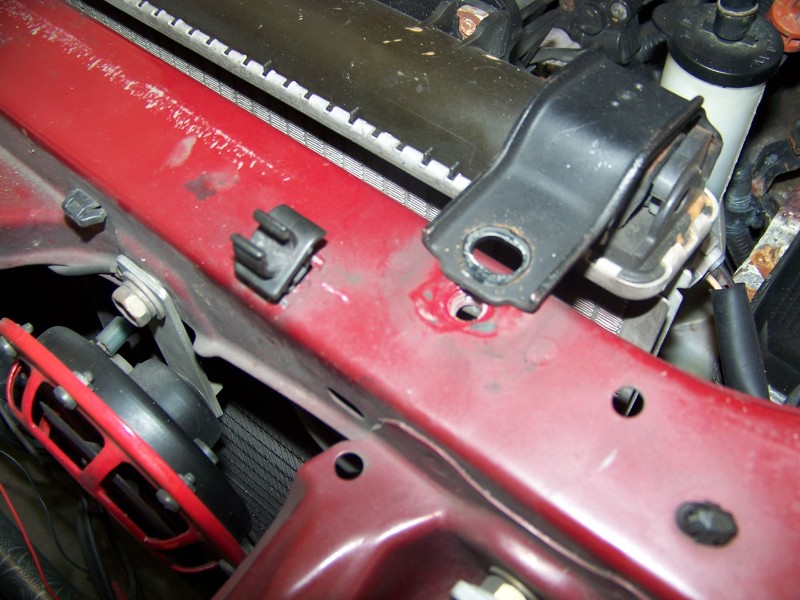
Then I removed the bolts that hold down the radiator and the clip that holds the bar that keeps the hood open .
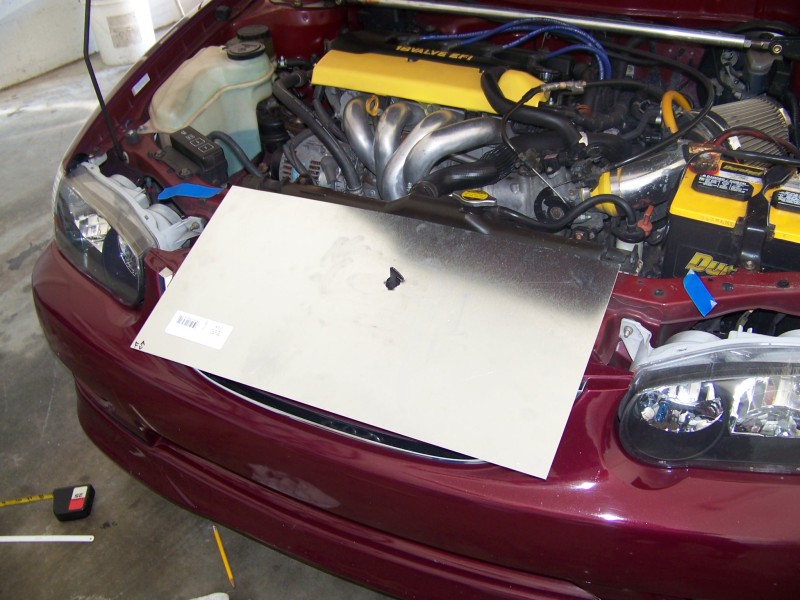
With the leading edge of the sheet metal laying across the radiator frame , Then centering the hood hinge , marked it and cut a hole so that the hook shows through and then re-aligned the piece .
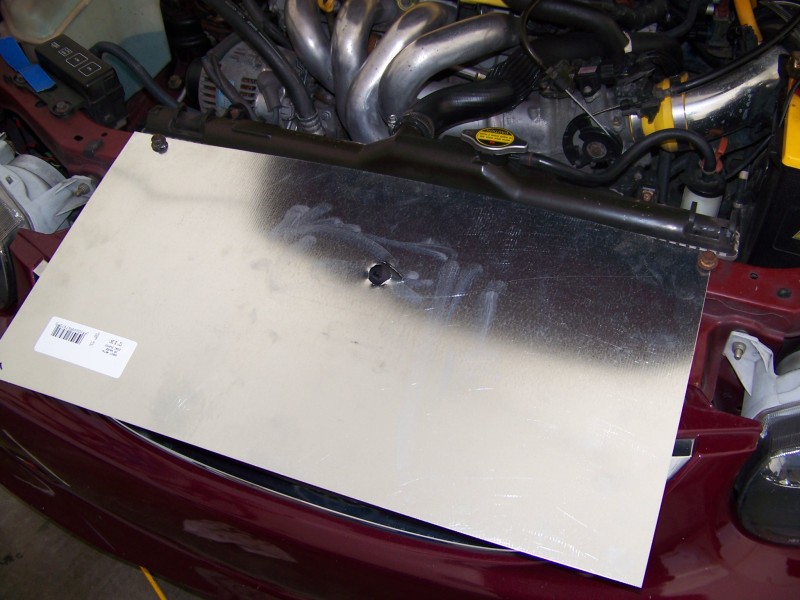
Drill out your bolt holes for the radiator hold down clamp & the clip that holds the hood bar , so that the sheet metal doesnt move when you start to cut the openings .
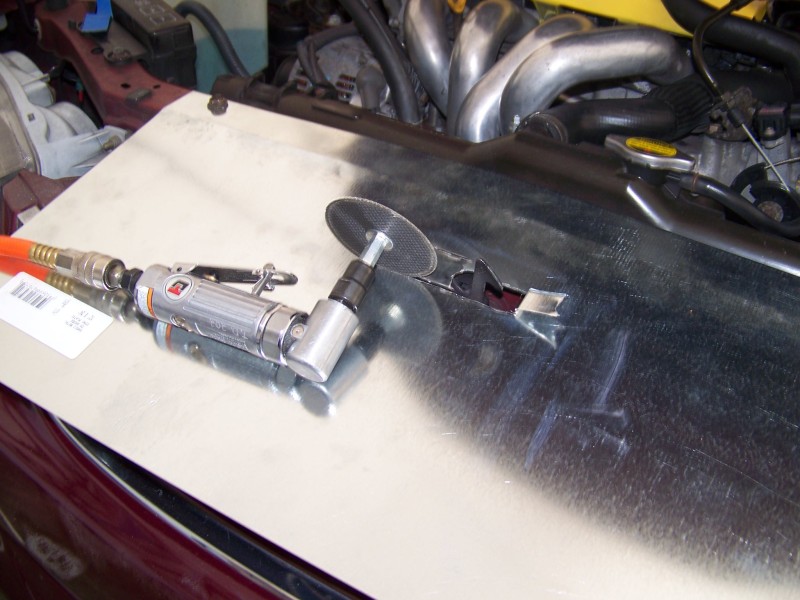
Then with my air tool dremel I would raise the sheet metal so that I knew how close I wanted to be near the hing and the handle with out cutting it but yet not making the opening big .
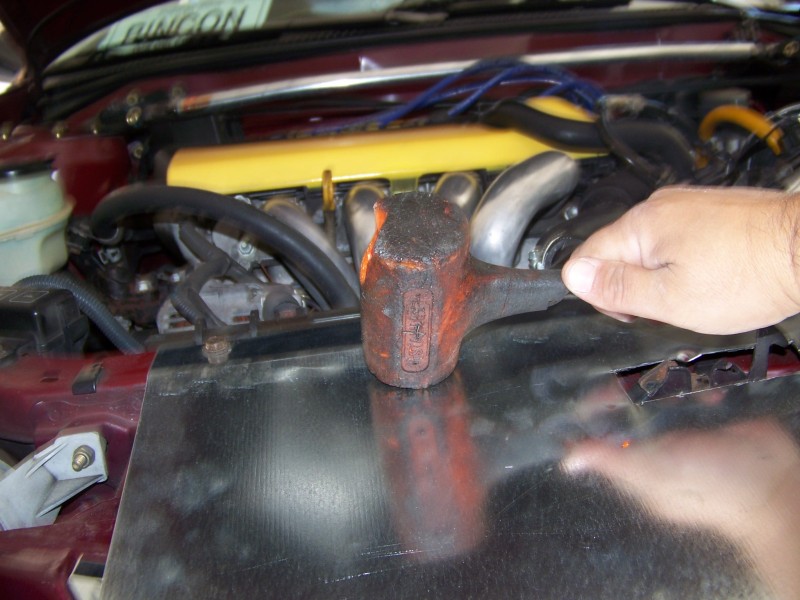
Then with my rubber malot I tapped slightly on the edge so that the aluminum would slighty bend on a angle leaning towards the front so that the handle and the hinge would be slightly higher then the metal .
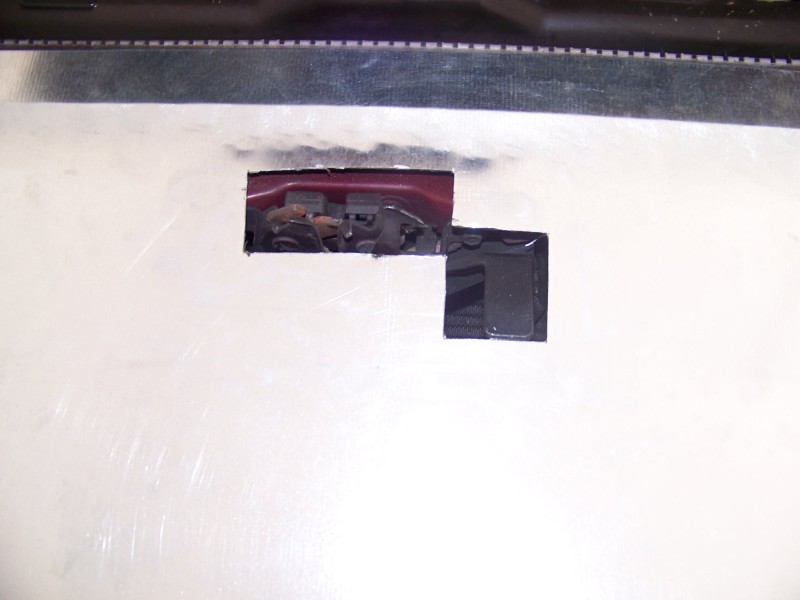
You can use the palms of your hand and push down to help it form into shape with out having alot of dents from the rubber malot .
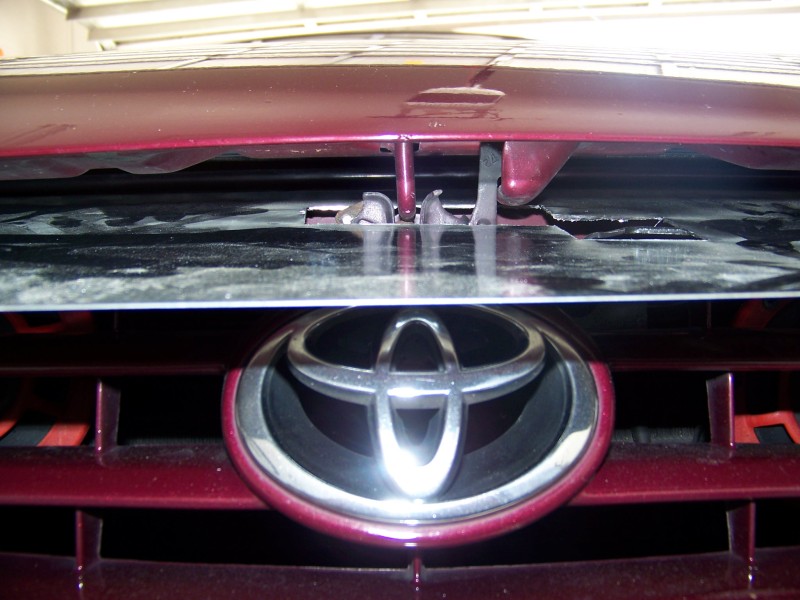
Once that is finished you test the height out by lowering the hood and not shutting it but hearing it click . Check the clearance so that when the hood is completly shut that there is no rubbing or hitting and then make sure the handle is higher then the metal so you can open the hood . ( If it still needs to be trimmed or bent then you repeat the other steps above . )
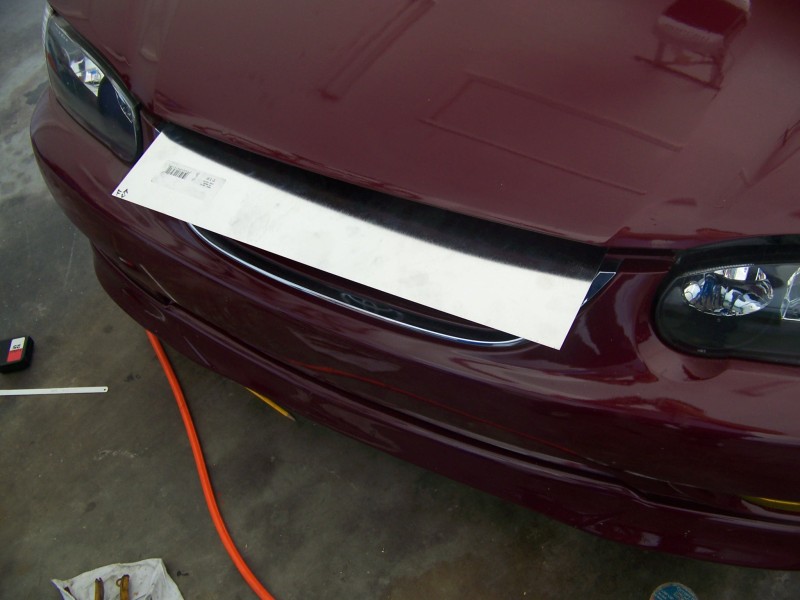
After everything is good then you draw a outline , but give yourself some extra cause you want to make sure it goes under the lip of the nose , Plus you have to put the screw holes to for the nose . Then you unscrew the hole piece and cut away from the car . ( Advise : Do not trim this piece while its still on the car . You might scratch the paint or bend the aluminum upwards .)
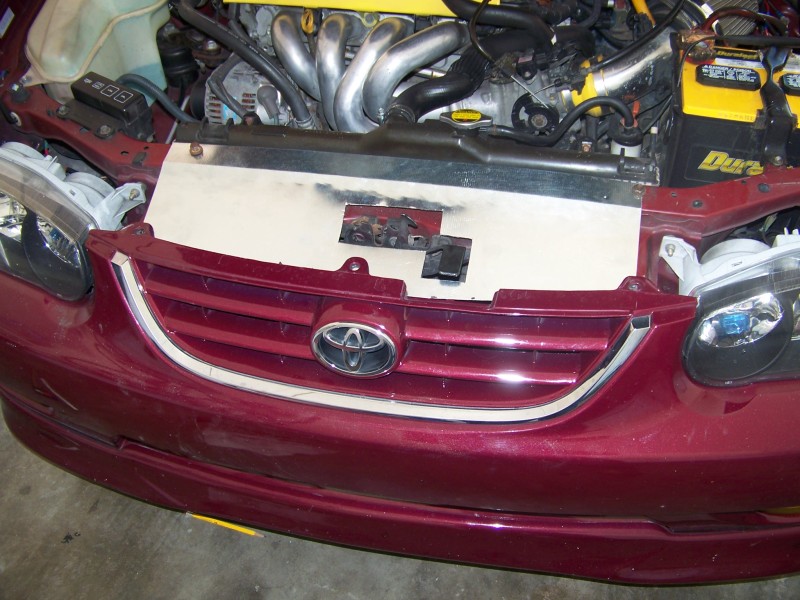
Then you keep trying to fit the piece and then when you finally think this is what you want then you remove to paint it or if you dont want to paint then you are finished at this point bolt the piece down . ( Remember : Make sure you put a hole for the hood clip . )
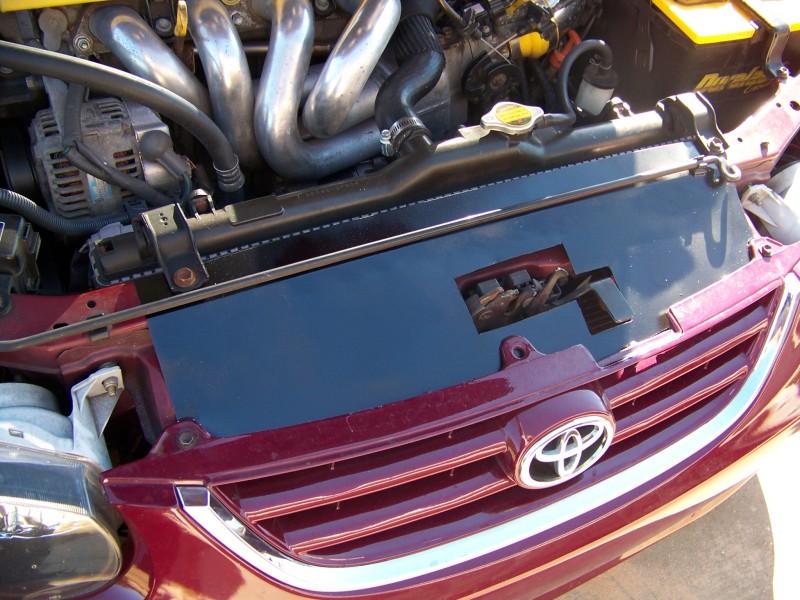
Once you sandpaper the aluminum sheet metal so that the paint can stick to the surface . Then you paint it with a couple of coats . Then when it is dried you can bolt the cooling plate down . ( Make sure you sand the edges for sharp metal sticking out be very careful you can cut yourself .)
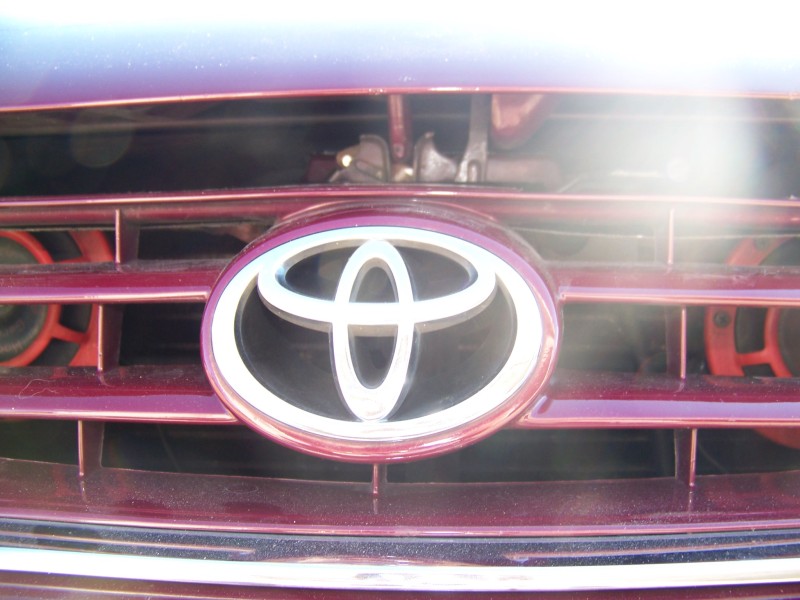
Then you give it one more look , Then you can shut your hood , And there you have it a Radiator Cooling Plate .
You can drive around town and test it .
I recently drove the car and it defintly moved the coolant needle down . Very noticable .
Note :
This sheilds purpose is to maximize cooling capabilities, a radiator needs a direct flow of air to allow an engine to maintain consistent temperatures on the race track or highway . Because of structural gaps above the radiator, the flow of air could escape making the radiator not as efficient as it could be. Especially if you run your A/C in the hot summer months .

First I measured . Then I went to my local Home Depot and purchased a pre-cut piece of aluminum sheet metal . This sheet was 27 x 12 .

Then I removed the bolts that hold down the radiator and the clip that holds the bar that keeps the hood open .

With the leading edge of the sheet metal laying across the radiator frame , Then centering the hood hinge , marked it and cut a hole so that the hook shows through and then re-aligned the piece .

Drill out your bolt holes for the radiator hold down clamp & the clip that holds the hood bar , so that the sheet metal doesnt move when you start to cut the openings .

Then with my air tool dremel I would raise the sheet metal so that I knew how close I wanted to be near the hing and the handle with out cutting it but yet not making the opening big .

Then with my rubber malot I tapped slightly on the edge so that the aluminum would slighty bend on a angle leaning towards the front so that the handle and the hinge would be slightly higher then the metal .

You can use the palms of your hand and push down to help it form into shape with out having alot of dents from the rubber malot .

Once that is finished you test the height out by lowering the hood and not shutting it but hearing it click . Check the clearance so that when the hood is completly shut that there is no rubbing or hitting and then make sure the handle is higher then the metal so you can open the hood . ( If it still needs to be trimmed or bent then you repeat the other steps above . )

After everything is good then you draw a outline , but give yourself some extra cause you want to make sure it goes under the lip of the nose , Plus you have to put the screw holes to for the nose . Then you unscrew the hole piece and cut away from the car . ( Advise : Do not trim this piece while its still on the car . You might scratch the paint or bend the aluminum upwards .)

Then you keep trying to fit the piece and then when you finally think this is what you want then you remove to paint it or if you dont want to paint then you are finished at this point bolt the piece down . ( Remember : Make sure you put a hole for the hood clip . )

Once you sandpaper the aluminum sheet metal so that the paint can stick to the surface . Then you paint it with a couple of coats . Then when it is dried you can bolt the cooling plate down . ( Make sure you sand the edges for sharp metal sticking out be very careful you can cut yourself .)

Then you give it one more look , Then you can shut your hood , And there you have it a Radiator Cooling Plate .
You can drive around town and test it .
I recently drove the car and it defintly moved the coolant needle down . Very noticable .
Note :
This sheilds purpose is to maximize cooling capabilities, a radiator needs a direct flow of air to allow an engine to maintain consistent temperatures on the race track or highway . Because of structural gaps above the radiator, the flow of air could escape making the radiator not as efficient as it could be. Especially if you run your A/C in the hot summer months .



 Aww man, at least you tried. What are you planning to try next?
Aww man, at least you tried. What are you planning to try next?
